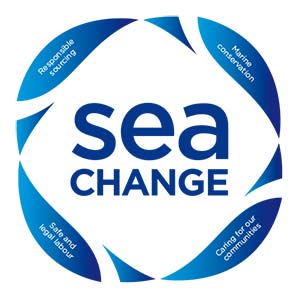Bangkok-headquartered Thai Union Group, which reported record annual sales of THB 125.2 billion on February 24, has announced an international consultation program with key stakeholders as part of its “Sea Change Sustainability Strategy.”
The consultation will take place from early March to the end of June 2016, and will engage customers, partners, non-government organizations (NGOs), industry organizations, regulators, policymakers and suppliers. Feedback will be through a combination of face-to-face meetings and online engagement.
 A microsite providing top-line details of the Sea Change strategy will be launched while the consultation period is under way, and updated with full information of the programs and initiatives in July.
A microsite providing top-line details of the Sea Change strategy will be launched while the consultation period is under way, and updated with full information of the programs and initiatives in July.
Dr. Darian McBain, Thai Union Group’ s global director of sustainable development, said, “We have been working with partners and NGOs in Thailand on improving labor conditions for Thai and migrant supply chain workers and have found that partnership and open engagement with all parties delivers practical and meaningful improvements. We are now extending this approach to key international stakeholders across a broad range of issues facing the global fishing industry so that our sustainability action plans benefit from expertise and knowledge beyond our own.”
Dr. McBain said the company developed the Sea Change strategy to address pressing needs in the Thai fishing and global seafood industries. It worked closely with NGOs – including Project Issara, the Migrant Workers Rights Network (MWRN) and the Labor Promotion Network (LPN) – during its first stage while addressing labor rights.
 Dr. Darian McBain (in background), group director of sustainable development for the Thai Union Group, joined as a volunteer to teach English to pupils at the Thai Union Child Care Center in Wat Si Suttharam School, Samut Sakhon province.Thai Union now wants input from the wider industry, intergovernmental and NGO community in shaping other action plans to address issues including marine conservation, traceability, and illegal, unregulated and unreported (IUU) fishing.
Dr. Darian McBain (in background), group director of sustainable development for the Thai Union Group, joined as a volunteer to teach English to pupils at the Thai Union Child Care Center in Wat Si Suttharam School, Samut Sakhon province.Thai Union now wants input from the wider industry, intergovernmental and NGO community in shaping other action plans to address issues including marine conservation, traceability, and illegal, unregulated and unreported (IUU) fishing.
“We all have an interest in ensuring seas are fished sustainably now and in the future,” she said. “This can only be done when seafood is sourced from vessels which observe all laws and regulations, and operate legally and responsibly. In addition, our workers, wherever they may be, are entitled to safe, legal and secure employment. These issues will be addressed by our Sea Change strategy. ”
Sea Change comprises four key programs – responsible sourcing, marine conservation, safe and legal labor, and caring for communities. Each has goals and a supporting 2020 action plan.
English Classes for Migrant Children
In other news, Thai Union has initiated English language classes for children enrolled in the Thai Union Child Center and seventh grade students at the Wat Si Suttharam School in Samut Sakhon province. The program, led by both Thai and expatriate Thai Union employees, is part of the company’s commitment to promote lifelong learning opportunities, in support of the UN Sustainable Development Goals.
 Thai Union English teaching volunteers engage closely with the migrant students.“We believe that education is an important foundation for success in life. The ability to learn English from an early age could be advantageous for these children in an increasingly globalized world,” said Dr. McBain.
Thai Union English teaching volunteers engage closely with the migrant students.“We believe that education is an important foundation for success in life. The ability to learn English from an early age could be advantageous for these children in an increasingly globalized world,” said Dr. McBain.
The Thai Union Child Care Center was established in 2013 to offer basic education and prepare the children of migrant workers in Samut Sakhon province for subsequent formal education in the Thai school system. Thai Union has invested THB 10 million in the program, which has allowed for two child care centers to open in Samut Sakhon province. There are plans for another three centers to become operational by 2017.
Record Sales and Net Profit
Meanwhile, the company has reported record figures for 2015. Sales rose 3.1% to THB 125.2 billion, while net profit (before one-time charges) climbed 19.1% to THB 6.1 billion. Earnings per share were up 1.1% to THB 1.11. After the non-operational one-time expenses, reported net profit was THB 5.3 billion, still a new record. Earnings before interest, taxes, depreciation and amortization (EBITDA) also hit a record high at THB 11.5 billion, up 4.8% from a year ago.
The encouraging result was attributed to strong performances from the company’s seafood brands in Europe, successful integration of recent acquisitions, namely MerAlliance (a leading chilled smoked salmon producer in Europe), King Oscar (a premium sardine brand distributed globally) and Orion (the largest lobster supplier in North America), a strong recovery of its Thailand-based shrimp processing operations, and the successful restructuring of USPN (a United States-based pet food producer).
The US dollar appreciation against Thai baht in the latter part of the year also had a positive effect. Nevertheless, there were challenges to cope with ranging from the highly volatile euro exchange rate and sharply lower tuna and shrimp raw material prices, to major importing countries’ concern about Thailand’s sustainability issues, and termination of the Bumble Bee tuna company purchase in the United States.
The annual result would have been even stronger without the posting of certain one-time non-operational charges, namely realization of expenses incurred from previously planned capital and debt raising activities (a consequence of cancellation of the Bumble Bee transaction in early December of 2015), an internal non-cash restructuring charge on the firm’s fishing business, and some other petty charges. Without these occurrences, 2015 net profit would have been THB 6.1 billion – an almost 19.1 % increase over the previous year’s result.
Due to the booking of these one-time charges in the fourth quarter, the reported net profit dropped to THB 757 million despite record quarterly sales of THB 33.3 billion, or $930 million. The normalized net profit (reflecting true operating performance) should be THB 1,534 million. The result is considered encouraging, given that the fourth quarter is a seasonally softer period. The company indeed posted its highest-ever quarterly sales in US dollar terms ($1 billion, or THB 32.8 billion) in the third quarter of 2015. Thanks to Thai baht depreciation late in the year, sales of the fourth quarter were nevertheless the highest ever in Thai baht terms.
 Thiraphong Chansiri, president and ceo of Thai Union Group, is pleased to report that 2015 was “another great year with record sales and net profit.”“This is another great year with record sales and net profit,” stated Thiraphong Chansiri, president and chief executive officer of Thai Union Group. “The 2015 result demonstrates our resilience and ability to grow in spite of a host of challenges faced by Thailand and the global seafood industry. Volatile foreign exchange rates, global correction of tuna and shrimp prices, uncertain global economic conditions and sustainability issues faced by Thailand did not discourage us from outperforming the industry. While our top line might be a bit short of the original target, our bottom line has nevertheless more than made up for the shortfall, allowing us to set another record level.”
Thiraphong Chansiri, president and ceo of Thai Union Group, is pleased to report that 2015 was “another great year with record sales and net profit.”“This is another great year with record sales and net profit,” stated Thiraphong Chansiri, president and chief executive officer of Thai Union Group. “The 2015 result demonstrates our resilience and ability to grow in spite of a host of challenges faced by Thailand and the global seafood industry. Volatile foreign exchange rates, global correction of tuna and shrimp prices, uncertain global economic conditions and sustainability issues faced by Thailand did not discourage us from outperforming the industry. While our top line might be a bit short of the original target, our bottom line has nevertheless more than made up for the shortfall, allowing us to set another record level.”
Tuna, Shrimp Generate 66% of Receipts
The tuna category still commanded the largest share of business in 2015, accounting for 37% of revenues. Next was shrimp and related business, 29%; salmon, 9%; pet food, 7%; sardine and mackerel sales, 6%; and value-added and other products, 12%.
Going into 2016, the disclosure of sales information will be made under three categories instead of six, as follows: ambient (shelf-stable) seafood, 47% in 2015; frozen, chilled and related seafood, 40%; and pet care, value-added and other products, 13%. The new classification will better explain the growth dynamics and margin trends of Thai Union’s business.
The sales contribution from proprietary brands was stable at 41% last year, with the balance attributed to private label sales. The United States remained the company’s largest market, accounting for 42% of total receipts. Next was Europe at 29%, followed by the Thai domestic market at 8%, Japan at 6%, and other markets at 14%.
Following a strong performance in 2015, the company’s executive team holds an optimistic view about 2016 prospects, notwithstanding uncertain world economic conditions and its potential impact on consumption and commodity prices.
President Chansiri commented, “We are well positioned for another solid year in 2016. The year is a period which we would reset our base for further growth. A lot of new initiatives are being launched – namely our continual drive for innovations in products and production processes, a new focus on serving foodservice customers, and emerging markets in the Middle East, Southeast Asia and China. Therefore, growth will be primarily driven by these new endeavors and the full consolidation of Rugen Fisch, which is our latest 51% acquisition of the leading seafood producer with own brands in Germany, into the group.”





